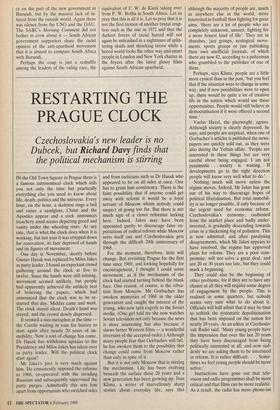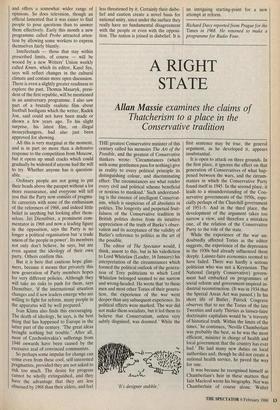RESTARTING THE PRAGUE CLOCK
Czechoslovakia's new leader is no the political mechanism is stirring
IN the Old Town Square in Prague there is a famous astronomical clock which tells you not only the time but practically everything else you need to know about life, death, politics and the universe. Every hour, on the hour, a skeleton rings a bell and raises a sandglass, Christ and the Apostles appear and a cock announces treachery amid scenes depicting greed and vanity under the wheeling stars. At any rate, that is what the clock does when it is working, but last year it was stripped down for renovation, its face deprived of hands and its figures of movement.
One day in November, shortly before Gustav Husak was replaced by Milos Jakes as party leader, I found an expectant crowd gathering around the clock at five to twelve. Since the hands were still missing, movement seemed unlikely, but people had apparently achieved the unlikely feat of believing the papers, which had announced that the clock was to be re- started that day. Midday came and went. The clock stayed silent, Death's hand was stayed, and the crowd slowly dispersed.
It seemed a nice metaphor at the time the Czechs waiting in vain for history to start again after nearly 20 years of im- mobility. Now a sort of change has come. Dr Husak has withdrawn upstairs to the Presidency and Milos Jakes has taken over as party leader. Will the political clock start again?
Mr Jakes's past is very much against him. He consistently opposed the reforms in 1968, co-operated with the invading Russians and subsequently supervised the party purges. Admittedly this sets him apart from opportunists who switched sides and from tacticians such as Dr Husak who appeared to be on all sides at once. One has to grant him consistency. There is the faint possibility that if anyone could get away with reform it would be a loyal servant of Moscow whom nobody could suspect of going too far. But there is not much sign of a closet reformist lurking here. Indeed, Jakes may have been appointed partly to discourage false ex- pectations of radical reform while Moscow sorts itself out and Czechoslovakia gets through the difficult 20th anniversary of 1968.
For the moment, therefore, little will change. But revisiting Prague for the first time since 1969, and looking hopefully for encouragement, I thought I could sense movement, as if the mechanism of the clock had started turning behind the blank face. One reason, of course, is the vibra- tion from Moscow. Mr Gorbachev has awoken memories of 1968 in the older generation and caught the interest of the young, who now turn eagerly to the Soviet media. (One girl told me she now watches Soviet television not only because the news is more interesting but also because it shows better Western films — a wonderful inversion of the accepted order.) Although many people fear that Gorbachev will fail, he has awoken them to the possibility that change could come from Moscow rather than only in spite of it.
But it is not only Moscow that is stirring the mechanism. Life has been evolving beneath the surface these 20 years and a new generation has been growing up. Ivan Klima, a writer of marvellously sharp stories about everyday life, says that although the majority of people are, much as anywhere else in the world, more interested in football than fighting for great aims, 'there are a lot of people who are completely unknown, unseen, fighting for a more honest kind of life'. They are in churches, jazz groups, ecological move- ments, sports groups or just publishing their own unofficial journals, of which there are now 42, according to a policeman who grumbled to the publisher of one of them.
Perhaps, says Klima, people are a little more cynical than in the past, tut you feel that if the situation were to change in some way, and if new possibilities were to open up, there would be quite a lot of creative life in the nation which would use these opportunities. People would still believe in democratisation if it were offered a second time.'
Vaclav Havel, the playwright, agrees..
Although society is clearly depressed, he says, and people are sceptical, when one of Gorbachev's articles is published the news- papers are quickly sold out, as they were also during the Yeltsin affair. 'People are interested in these things but are very careful about being engaged. I am not pessimistic . . . society is waiting. If developments go in the right direction people will know very well what to do.'
Nothing much will move unless the regime moves. Indeed, Mr Jakes has gone out of his way to discourage hopes of political liberalisation. But total immobil- ity is no longer possible, if only because of the urgent need for economic reform.
Czechoslovakia's economy, cushioned from the market place and badly under- invested, is gradually descending towards crisis in a thickening fog of pollution. This is now admitted, and after paralysing disagreements, which Mr Jakes appears to have resolved, the regime has approved plans for reform. They are a poor com- promise, will not solve a great deal, and are 20 or 30 years too late, but they could mark a beginning.
They could also be the beginning of other problems, for if they are to have any chance at all they will require some degree of engagement by the people. This is realised in some quarters, but nobody seems very sure what to do about it.
Officials will half admit that it may be time to rethink the systematic depoliticisation that has been imposed on the nation for nearly 20 years. As an editor at Czechoslo- vak Radio said, 'Many young people have the impression that over the last 20 years they have been discouraged from being politically interested at all, and now sud- denly we are asking them to be interested in reform. It is rather difficult. . . . Some- times we feel young people should be more active.'
Instructions have gone out that tele- vision and radio programmes shall be more critical and that films can be more realistic. As a result, the radio has more phone-ins and offers a somewhat wider range of opinions. So does television, though an official lamented that it was easier to find people to pose questions than to answer them effectively. Early this month a new programme called Probe attracted atten- tion by allowing some workers to express themselves fairly bluntly.
Intellectuals — those that stay within prescribed limits, of course — will be wooed by a new. Writers' Union weekly called Kmen, which its editor, Karel Sys, says will reflect changes in the cultural climate and contain more open discussion. There is even a slightly greater readiness to explore the past. Thomas Masaryk, presi- dent of the first republic, will be mentioned in an anniversary programme. I also saw part of a brutally realistic film about football hooligans which the writer, Radek Jon, said could not have been made or shown a few years ago. To his slight surprise, his latest film, on illegal moneychangers, had also just been approved for showing.
All this is very marginal at the moment, and is in part no more than a defensive response to the competition from Moscow, but it opens up small cracks which could gradually be widened if anyone had the will to try. Whether anyone has is question- able.
Ordinary people are not going to put their heads above the parapet without a lot more reassurance, and everyone will tell you that the Party now consists of pragma- tic careerists with none of the enthusiasm of the reformers of 1968, and indeed little belief in anything but looking after them- selves. Jiri Dienstbier, a prominent com- mentator in 1968 and now a leading figure in the opposition, says the Party is no longer a political organisation but 'a trade union of the people in power'. Its members not only don't believe, he says, but are even against the ideology of their own party. Others confirm this. But it is here that cautious hope glim- mers, because it means that privately this new generation of Party members hopes for very different policies. Although they will take no risks to push for them, says Dienstbier, 'if the international situation changes and if new leaders emerge who are willing to fight for reform, many people in the apparatus will be well prepared.' Ivan Klima also finds this encouraging. The death of ideology, he says, is the best thing that has happened to Europe in the latter part of the century. 'The great ideas brought nothing but trouble.' After all, most of Czechoslovakia's sufferings from 1948 onwards have been caused by the excessive zeal of convinced communists.
So perhaps some impulse for change can come even from these cool, self-interested pragmatists, provided they are not asked to risk too much. The desire for progress cannot be wholly extinguished, and they have the advantage that they are less obsessed by 1968 than their elders, and feel less threatened by it. Certainly their disbe- lief and caution create a novel basis for national unity, since under the surface they really have no fundamental disagreement with the people or even with the opposi- tion. The nation is joined in disbelief. It is an intriguing starting-point for a new attempt at reform.
Richard Davy reported from Prague for the Times in 1968. He returned to make a programme for Radio Four.



















































 Previous page
Previous page